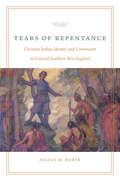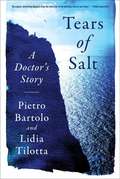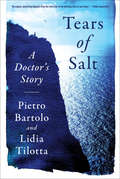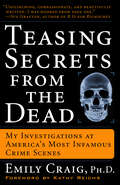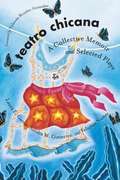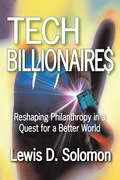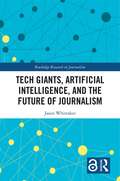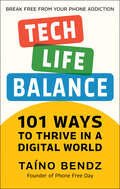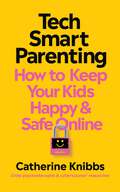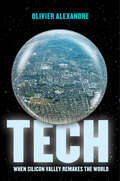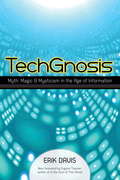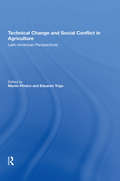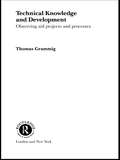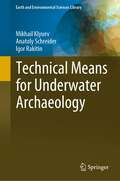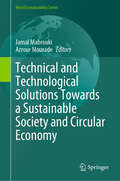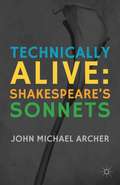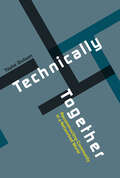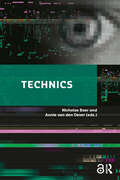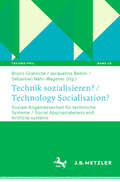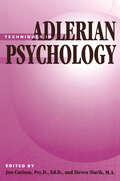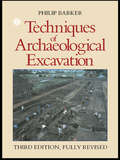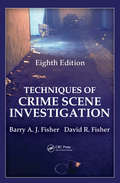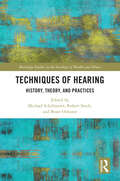- Table View
- List View
Tears of Repentance: Christian Indian Identity and Community in Colonial Southern New England
by Julius H. RubinTears of Repentance revisits and reexamines the familiar stories of intercultural encounters between Protestant missionaries and Native peoples in southern New England from the seventeenth to the early nineteenth centuries. Focusing on Protestant missionaries&’ accounts of their ideals, purposes, and goals among the Native communities they served and of the religion as lived, experienced, and practiced among Christianized Indians, Julius H. Rubin offers a new way of understanding the motives and motivations of those who lived in New England&’s early Christianized Indian village communities.Rubin explores how Christian Indians recast Protestant theology into an Indianized quest for salvation from their worldly troubles and toward the promise of an otherworldly paradise. The Great Awakening of the eighteenth century reveals how evangelical pietism transformed religious identities and communities and gave rise to the sublime hope that New Born Indians were children of God who might effectively contest colonialism. With this dream unfulfilled, the exodus from New England to Brothertown envisioned a separatist Christian Indian commonwealth on the borderlands of America after the Revolution.Tears of Repentance is an important contribution to American colonial and Native American history, offering new ways of examining how Native groups and individuals recast Protestant theology to restore their Native communities and cultures.
Tears of Salt: A Doctor's Story
by Lidia Tilotta Pietro BartoloDr. Pietro Bartolo has worked on Lampedusa for more than 25 years. He has been responsible for the Island's clinic and reception for immigrants fleeing their home countries because of persecution and/or extreme poverty. His book is an eyewitness account of tragedy and hope. The stories have been put down on paper as Dr. Bartolo recalls them. The are told without filter or embellishment. The book is terribly sad, painful, revealing, but ultimately, because of the Lampedusans and their untiring helpers, redeeming. From deepest loss, sometimes there is joy. I believe this book should impact the lives of the readers.
Tears of Salt: A Doctor's Story
by Lidia Tilotta Pietro BartoloThe internationally best-selling personal story of "the doctor on the front lines of the migrant crisis" (CNN). Situated more than one hundred miles off Italy’s southern coast, the rocky island of Lampedusa has hit world headlines in recent years as the first port of call for hundreds of thousands of African and Middle Eastern refugees fleeing civil war and terrorism and hoping to make a new life in Europe. Dr. Pietro Bartolo, who runs the lone medical clinic on the island, has been caring for many of them—both the living and the dead—for a quarter century. Tears of Salt is Dr. Bartolo’s moving account of his life and work set against one of the signal crises of our time. With quiet dignity and an unshakable moral center, he tells unforgettable tales of pain and hope, stories of those who didn’t make it and those who did. Tears of Salt is a lasting work of literature and an intimate portrait of a remarkable man whose inspiring message rings clear: "We can’t and we won’t be governed by our fears."
Teasing Secrets from the Dead: My Investigations at America's Most Infamous Crime Scenes
by Emily CraigTeasing Secrets from the Dead is a front-lines story of crime scene investigation at some of the most infamous sites in recent history. In this absorbing, surprising, and undeniably compelling book, forensics expert Emily Craig tells her own story of a life spent teasing secrets from the dead. Emily Craig has been a witness to history, helping to seek justice for thousands of murder victims, both famous and unknown. It's a personal story that you won't soon forget. Emily first became intrigued by forensics work when, as a respected medical illustrator, she was called in by the local police to create a model of a murder victim's face. Her fascination with that case led to a dramatic midlife career change: She would go back to school to become a forensic anthropologist--and one of the most respected and best-known "bone hunters" in the nation. As a student working with the FBI in Waco, Emily helped uncover definitive proof that many of the Branch Davidians had been shot to death before the fire, including their leader, David Koresh, whose bullet-pierced skull she reconstructed with her own hands. Upon graduation, Emily landed a prestigious full-time job as forensic anthropologist for the Commonwealth of Kentucky, a state with an alarmingly high murder rate and thousands of square miles of rural backcountry, where bodies are dumped and discovered on a regular basis. But even with her work there, Emily has been regularly called to investigations across the country, including the site of the terrorist attack on the Murrah Building in Oklahoma City, where a mysterious body part--a dismembered leg--was found at the scene and did not match any of the known victims. Through careful scientific analysis, Emily was able to help identify the leg's owner, a pivotal piece of evidence that helped convict Timothy McVeigh. In September 2001, Emily received a phone call summoning her to New York City, where she directed the night-shift triage at the World Trade Center's body identification site, collaborating with forensics experts from all over the country to collect and identify the remains of September 11 victims. From the biggest news stories of our time to stranger-than-true local mysteries, these are unforgettable stories from the case files of Emily Craig's remarkable career.
Teatro Chicana
by Laura E. Garcia Sandra M. Gutierrez Felicitas NuñezThe 1970s and 1980s saw the awakening of social awareness and political activism in Mexican-American communities. In San Diego, a group of Chicana women participated in a political theatre group whose plays addressed social, gender, and political issues of the working class and the Chicano Movement. In this collective memoir, seventeen women who were a part of Teatro de las Chicanas (later known as Teatro Laboral and Teatro Raíces) come together to share why they joined the theatre and how it transformed their lives. Teatro Chicana tells the story of this troupe through chapters featuring the history and present-day story of each of the main actors and writers, as well as excerpts from the group's materials and seven of their original short scripts.
Tech Billionaires: Reshaping Philanthropy in a Quest for a Better World
by Lewis D. SolomonIn the first decade of the twenty-first century a new wave of thinking has emerged from tech billionaires that may shape the way private capital gets invested to tackle social problems. These entrepreneurs broke the business mold in the 1980s and 1990s and are now trying to break the traditional pattern of philanthropy pioneered by Andrew Carnegie and John D. Rockefeller, Sr. some one hundred years ago. Combining billions of dollars of their personal capital with new ideas, cutting-edge businesslike techniques, media and marketing savvy, the tech benefactors profiled in this book are attacking some of the globe's most intractable societal problems. In trying to make a difference in the world, these new philanthropists, dubbed "philanthrocapitalists" by rhe author seek to break down traditional barriers dividing business, charity, and government. As a result of the rapid wealth creation in recent years, the world now boasts 1,125 billionaires, many of whom are self-made, according to the Forbes' 2008 list, including Bill Gates, Pierre Omidyar, Jeffrey Skoll, Stepehn Case, Sergey Brin, Larry Page, and more. Their massive wealth has created new philanthropic challenges. Imaginative giving by the new billionaires is beginning to transform philanthropy in terms of timing, involvement, strategy, and tactics. How this development impacts society as a whole is the subject of Lewis Solomon's book. As the author notes, the traditional categories of business and philanthropy may no longer serve to meet the challenge of social problems. In the twenty-first century the tools and resources used to solve societal problems will be far more varied and mixed than previously. We now see interesting partnerships and new ways of thinking. The divide between profit and social good will narrow. If successful in using their money in innovative ways, government or for-profit business could scale up the catalytic efforts of the new philanthropists. This volume is a proactive, innovative guide to a new era, not just a new technique of monetary support.
Tech Giants, Artificial Intelligence, and the Future of Journalism (Routledge Research in Journalism)
by Jason Paul WhittakerThis book examines the impact of the "Big Five" technology companies – Apple, Alphabet/Google, Amazon, Facebook and Microsoft – on journalism and the media industries. It looks at the current role of algorithms and artificial intelligence in curating how we consume media and their increasing influence on the production of the news. Exploring the changes that the technology industry and automation have made in the past decade to the production, distribution and consumption of news globally, the book considers what happens to journalism once it is produced and enters the media ecosystems of the internet tech giants – and the impact of social media and AI on such things as fake news in the post-truth age. The audience for this book are students and researchers working in the field of digital media, and journalism studies or media studies more generally. It will also be useful to those who are looking for extended case studies of the role taken by tech giants such as Facebook and Google in the fake news scandal, or the role of Jeff Bezos in transforming The Washington Post. The Open Access version of this book, available at https://doi.org/10.4324/9781351013758, has been made available under a Creative Commons Attribution-Non Commercial-No Derivatives 4.0 license.
Tech-Life Balance: 101 Ways to Thrive in a Digital World
by Taino BendzBreak free from technology and rediscover the joys of life with this ultimate guide featuring 101 creative ideas to fix your tech obsession! In today's world, we're constantly glued to our phones, checking social media, emails, and even the weather. But what if we told you that you could reduce stress, improve your wellbeing and sleep, increase your focus and productivity, experience better relationships and much more by using technology purposefully and mindfully? With Tech-Life Balance, you'll discover how to identify your poor tech-use habits and make small changes that have a big impact. Written by the founder of the international challenge 'Phone Free Day', Tech-Life Balance offers real solutions to break free from your digital addiction. From making your home and workspace tech-free during downtime to maintaining healthy tech habits while living with others who don't, you'll learn how to balance your tech use and make room for other healthy activities like exercise and hobbies. Tech-Life Balance includes such topics as:Identifying your poor tech-use habits and triggersPurposeful/mindful use of social mediaMaking your home and workspace tech-free during downtimeHow to maintain healthy tech habits while living with other people who don&’tSuggestions for other healthy activities (exercise, involving hobbies) to fill the space formerly occupied by device useProper/prescriptive habits for recreational use of devices Tech-Life Balance is the ultimate life hack to help you break free from the grips of technology and live a less distracted and more fulfilling life. With its low-key and fun approach, this little book makes the perfect gift for anyone looking to regain control of their tech habits. So what are you waiting for? Grab your copy and take the first step towards a more balanced life!
Tech-Smart Parenting: How to keep your kids happy and safe online
by Catherine KnibbsThe essential new science-backed parenting guide to building healthy boundaries around technology and social media, from the leading cybertrauma expert and child psychotherapist, Catherine Knibbs.'A must-read for the tech-anxious generation' Pete Etchells, psychologist and author of Unlocked: The Real Science of Screen Time'An essential, expert (and overdue) guide for any parent worried about how tech is affecting their children, but wanting to rely on science instead of paranoia' – Dean Burnett, neuroscientist and authorShould we ban screens? We are asking the wrong question – this is how we really keep our kids safe online.'How much screen time is too much?' 'Could my child become addicted to their smartphone?' 'Why does every rule I set start a battle?' Children today are growing up in a world more connected than ever before, exposing them to dangers their parents didn’t even imagine and raising questions they've never considered. But in our rush to protect them, we can do more harm than good; outright bans and rules deemed ‘unfair’ can push your child away, when what they need most of all is you.Child psychotherapist and cybertrauma expert Catherine Knibbs has helped hundreds of families work together to build healthy boundaries around technology. In this science-backed guide, Knibbs sets out what the evidence really says about the risks and where your fears may be misguided, to empower you with the answers to make the right decisions for your family. You'll discover:How screens affect every stage of childhood and where the dangers actually lieThe importance of keeping your child close and onside to protect them, with scripts to help you communicate positively and set reasonable boundariesRealistic advice to keep your child safe and develop a balanced relationship with technology, within and out of the homeTips on protecting neurodivergent children and understanding how tech can help them flourishGrounded in evidence and full of relatable stories and practical tools, Tech-Smart Parenting is the essential book for any parent who wants to feel informed and confident in navigating the new digital childhood.
Tech: When Silicon Valley Remakes the World
by Olivier AlexandreThe first holistic analysis of the space, mindset, and inner workings of Silicon Valley in a generation. Sometimes only an outsider can show how an industry works—and how that industry works upon the world. In Tech, sociologist Olivier Alexandre takes us on a revealing tour of Silicon Valley's prominent personalities and vibrant networks to capture the way its denizens live, think, relate, and innovate, and how they shape the very code and conduct of business itself. Even seasoned observers will gain insight into the industry's singular milieu from Alexandre’s piercing eye. He spends as much time with Silicon Valley's major players as with those who fight daily to survive within a system engineered for disruption. Embedded deep within the community, Alexandre accesses rooms shut tight to the public and reports back on the motivations, ambitions, and radical vision guiding tech companies. From the conquest of space to quantum computing, engineers have recast the infinitely large and small. Some scientists predict the end of death and the replacement of human beings with machines. But at what cost? Alexandre sees a shadow hanging over the Valley, jeopardizing its future and the economy made in its image. Critical yet fair, Tech illuminates anew a world of perpetual revolution.
TechGnosis
by Erik Davis Eugene ThackerHow does our fascination with technology intersect with the religious imagination? In TechGnosis--a cult classic now updated and reissued with a new afterword--Erik Davis argues that while the realms of the digital and the spiritual may seem worlds apart, esoteric and religious impulses have in fact always permeated (and sometimes inspired) technological communication. Davis uncovers startling connections between such seemingly disparate topics as electricity and alchemy; online roleplaying games and religious and occult practices; virtual reality and gnostic mythology; programming languages and Kabbalah. The final chapters address the apocalyptic dreams that haunt technology, providing vital historical context as well as new ways to think about a future defined by the mutant intermingling of mind and machine, nightmare and fantasy.From the Trade Paperback edition.ology; programming languages and channeled texts. The final chapters address both apocalyptic and utopian dreams of the future of technology, providing historical context as well as new models for how to think and feel our way through an amazing, confusing, and disturbing time. This new edition features a foreword by Eugene Thacker as well as a new afterword reflecting on surveillance; the current tech bubble; the growth of superheroes, horror, and other "uncanny cultures" online; the growing backlash against technology; and the need to revitalize the cosmic imagination.ContentsIntroduction: crossed wires I imagining technologies II the alchemical fire III the gnostic infonaut IV techgnosis, american-style V the spiritual cyborg VI a most enchanting machine VII cyberspace: the virtual craft VIII the alien call IX datapocalypse X third mind from the sun XI the path is a network Afterword: beyond the boomFrom the Trade Paperback edition.
Technical Change And Social Conflict In Agriculture: Latin American Perspectives
by Martin E Pineiro Eduardo J TrigoThis book presents the intellectual production of the first phase of the Cooperative Research Project on Agricultural Technology in Latin America (PROTAAL) and the most relevant papers presented by invitees at a meeting held in San Jose, Costa Rica in September 1981.
Technical Difficulties: African-American Notes on the State of the Union
by June JordanCollection of essays on political and social issues by an African american feminist poet and writer.
Technical Knowledge and Development: Observing Aid Projects and Processes (Routledge Studies in Development and Society #Vol. 11)
by Thomas GrammigDevelopment and aid projects often fail to improve technological capacity. Their reform has been a widely acknowledged challenge for three decades. This book demonstrates theoretically and empirically how aid practitioners shape the organizational, social and inter-cultural dynamics of development projects in industry.
Technical Means for Underwater Archaeology (Earth and Environmental Sciences Library)
by Mikhail Klyuev Anatoly Schreider Igor RakitinThe book discusses various aspects of the technical support of underwater archaeological research in marine and freshwater areas. This book considers the relevance, specificity, and artifacts of underwater archaeological research, stating the factors of flooding of archaeological artifacts. The authors describe the basic equipment for underwater work, as well as the equipment for remote study of the bottom and underwater archaeological research. This book presents the usage of instrumentation in underwater archaeology. Case studies included in this book correspond to the flooded ancient Greek cities of Fanagoria and Patraeus in the Taman Bay of the Black Sea, flooded Neolithic settlements on Lake Sennitsa in the Pskov region of Russia, sunken ships in the north of the Black Sea and sunken liner “Titanic” in the Atlantic Ocean. The book is intended for students, graduate students and archaeologists who are interested in the specifics of underwater archaeological research and are planning to conduct it.
Technical and Technological Solutions Towards a Sustainable Society and Circular Economy (World Sustainability Series)
by Jamal Mabrouki Azrour MouradeResource depletion and ecological risks are more than ever at the heart of societal and economic debates. In the 1970s, the developed countries saw the Fordist growth regime crumble in parallel with the growing awareness of the ecological issue. Since the first industrial revolutions, technological dynamics have been the cause of many environmental problems, and there is a consensus on the diagnosis. Integrated technologies reduce resource use and/or pollution at source by using cleaner production methods. This generally leads to a reduction in the by-products, energy inputs and resources used by companies to produce goods.Integrated production technologies reduce negative environmental impacts at source by substituting or modifying cleaner technologies. Examples of integrated, or cleaner, production technologies are the recirculation of materials, the use of environmentally friendly materials (such as the substitution of water for organic solvents), etc. However, the implementation of integrated production technologies is often hampered by obstacles related to cost, coordination and skill inertia problems and to the productive organisation of companies. In addition to the high investment costs of new integrated technologies, additional barriers may emerge depending on the nature of the environmental problem and the type of environmental regulation in question.
Technically Alive
by John Michael ArcherDrawing on the later writings of Martin Heidegger, the book traces the correspondence between the philosopher's concept of technology and Shakespeare's poetics of human and natural productivity in the Sonnets.
Technically Together: Reconstructing Community in a Networked World
by Taylor DotsonWhy we should not accept “networked individualism” as the inevitable future of community. If social interaction by social media has become “the modern front porch” (as one sociologist argues), offering richer and more various contexts for community and personal connection, why do we often feel lonelier after checking Facebook? For one thing, as Taylor Dotson writes in Technically Together, “Try getting a Facebook status update to help move a couch or stay for dinner.” Dotson argues that the experts who assure us that “networked individualism” will only bring us closer together seem to be urging citizens to adapt their social expectations to the current limits of technology and discouraging them from considering how technologies could be refashioned to enable other ways of relating and belonging. Dotson characterizes different instantiations of community as “thick” or “thin,” depending on the facets and manifestations of togetherness that they encompass. Individuating social networks are a form of community, he explains, but relatively thin in regard to several dimensions of communality. Dotson points out that current technological practices are not foreordained but supported by policies, economic arrangements, and entrenched patterns of thought. He examines a range of systems, organizations, and infrastructures—from suburban sprawl and smartphones to energy grids and “cry-it-out” sleep training for infants—and considers whether they contribute to the atomization of social life or to togetherness and community vibrancy. Dotson argues that technology could support multifaceted communities if citizens stopped accepting the technological status quo and instead demanded more from their ever-present devices.
Technics Improvised: Activating Touch in Global Media Art
by Timothy MurraySeeing new media art as an entry point for better understanding of technology and worldmaking futures In this challenging work, a leading authority on new media art examines that curatorial and aesthetic landscape to explore how art resists and rewires the political and economic structures that govern technology. How do inventive combinations of artistic and theoretical improvisation counter the extent to which media art remains at risk, not just from the quarantines of a global pandemic but also from the very viral and material conditions of technology? How does global media art speak back to the corporate closures of digital euphoria as clothed in strategies of digital surveillance, ecological deprivation, and planned obsolescence? In Technics Improvised, Timothy Murray asks these questions and more. At the intersection of global media art, curatorial practice, tactical media, and philosophy, Murray reads a wide range of creative performances and critical texts that envelop artistic and digital materials in unstable, political relations of touch, body, archive, exhibition, and technology. From video to net art and interactive performance, he considers both canonical and unheralded examples of activist technics that disturb the hegemony of biopolitical/digital networks by staging the very touch of the unsettling discourse erupting from within. In the process, critical dialogues emerge between a wide range of artists and theorists, from Hito Steyerl, Ricardo Dominguez, Joan Jonas, Isaac Julien, Ryoji Ikeda, and Shadi Nazarian to Gilles Deleuze, Jean-Luc Nancy, Elizabeth Povinelli, Jean-François Lyotard, Erin Manning, Achille Mbembe, and Samuel Weber.Brilliantly conceived and argued and eloquently written, Technics Improvised points the way to how artistic and theoretical practice can seize on the improvisational accidents of technics to activate creativity, thought, and politics anew.
Technics: Media in the Digital Age (The Key Debates: Mutations and Appropriations in European Film Studies)
by Nicholas Baer van den Oever, AnnieFeaturing 28 leading international media scholars, Technics rethinks technology for the contemporary digital era, with cutting-edge theoretical, historiographical, and methodological interventions. The volume’s contributors explore the ideas of Walter Benjamin, Ursula Le Guin, Bernhard Siegert, Gilbert Simondon, and Sylvia Wynter in conjunction with urgent questions concerning algorithmic media, digital infrastructures, generative AI, and geoengineering. An expansive collection of writings on media technologies in the digital age, Technics is an essential resource for students and scholars of film and media studies, digital humanities, science and technology studies, and the philosophy of technology.
Technik sozialisieren? / Technology Socialisation?: Soziale Angemessenheit für technische Systeme / Social Appropriateness and Artificial Systems (Techno:Phil – Aktuelle Herausforderungen der Technikphilosophie #10)
by Bruno Gransche Jacqueline Bellon Sebastian Nähr-WagenerAnwendungen Künstlicher Intelligenz, Maschinellen Lernens sowie Robotik und weitere informatische Systeme spielen in immer mehr Bereichen der menschlichen Lebenswelt eine immer wichtigere Rolle. Technik wird dabei auch weiterhin und zunehmend Medium menschlicher Kommunikation und Interaktion sein, darüber hinaus wird jedoch auch immer mehr menschliche Interaktion nicht nur durch sondern mit Technik stattfinden. Eine Dimension neuer Mensch-Technik-Relationen ist dabei das Phänomen sozialer Angemessenheit. Obgleich sich dieses nicht auf ein einfaches Regelwerk reduzieren lässt, verhalten sich Menschen in zwischenmenschlicher Interaktion ganz selbstverständlich sozial angemessen und treffen in der Regel ohne Weiteres ‚den richtigen Ton‘. Wie aber verhält es sich mit ‚intelligenten‘ technischen Systemen? Können – sollten – diese mit Fähigkeiten zu entsprechendem Sozialverhalten ausgestattet werden, um damit auch eine weitere bedeutsame Grenze zwischen Mensch und Technik zum Verschwinden zu bringen? Anders gefragt: Ist es möglich und erforderlich, Technik zu sozialisieren?
Techniques In Adlerian Psychology
by Jon Carlson Steven SlavikFirst published in 1998. Routledge is an imprint of Taylor & Francis, an informa company.
Techniques of Archaeological Excavation
by Philip BarkerFirst published in 1993. Routledge is an imprint of Taylor & Francis, an informa company.
Techniques of Crime Scene Investigation (Forensic and Police Science)
by Barry A. J. Fisher David R. FisherThe application of science and technology plays a critical role in the investigation and adjudication of crimes in our criminal justice system. But before science can be brought to bear on evidence, it must be recognized and collected in an appropriate manner at crime scenes. Written by authors with over 50 years of combined experience in forensic science, Techniques of Crime Scene Investigation examines the concepts, field-tested techniques, and procedures of crime scene investigation. Detectives, crime scene technicians, and forensic scientists can rely on this updated version of the "forensics bible" to effectively apply science and technology to the tasks of solving crimes.
Techniques of Hearing: History, Theory and Practices
by Michael Schillmeier, Robert Stock, and Beate OchsnerHearing, health and technologies are entangled in multi-faceted ways. The edited volume addresses this complex relationship by arguing that modern hearing was and is increasingly linked to and mediated by technological innovations. By providing a set of original interdisciplinary investigations that sheds new light on the history, theory and practices of hearing techniques, it is able to explore the heterogeneous entanglements of sound, hearing practices, technologies and health issues. As the first book to bring together historians, scholars from media studies, social sciences, cultural studies, acoustics and neuroscientists, the volume discusses modern technologies and their decisive impact on how ‘normal’ hearing, enhanced and smart hearing as well as hearing impairment have been configured. It brings both new insights into the histories of hearing technologies as well as allowing us to better understand how enabling hearing technologies have currently been unfolding an increasingly hybrid ecology engaging smart hearing devices and offering stress-free hearing and acoustic wellbeing in novel auditory environments. The volume will be of interest to all scholars and students of disability studies, sound studies, sociology of health and illness, medical history, health and society as well as those interested in the practices and techniques of self-monitored and smart hearing.
